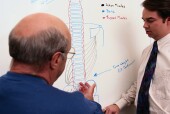
FRIDAY, March 16 (HealthDay News) — Deaf people are about twice as likely to have mental health problems as people in the general population, according to a new review of evidence.
In addition, deaf people have greater difficulty getting mental health care and the quality of care tends to be lower, according to the review appearing online March 15 in The Lancet.
The researchers also found that deaf children who cannot make themselves understood within their family are four times more likely to have mental health disorders and more likely to suffer mistreatment at school than deaf children who can communicate with their family members, according to a journal news release.
One study found that deaf boys were three times more likely and deaf girls twice as likely to report sexual abuse, compared to children who could hear.
The review found that deaf patients report fear, mistrust and frustration in health care services. Along with communication problems when seeing health professionals, deaf patients have difficulty accessing health information.
“Improved access to health and mental health care can be achieved by specialist services with professionals trained to directly communicate with deaf people and with sign-language interpreters,” said Dr. Johannes Fellinger, from the Health Centre for the Deaf at the Hospital of St. John of God in Linz, Austria, and colleagues.
About seven per 10,000 people worldwide are severely or profoundly deaf, with onset of deafness before language development, according to the release. U.S. research has shown that about 25 percent of deaf students have other disabilities, including learning difficulties, developmental delay, visual impairment and autism.
“Patients from the deaf community have the same need for good communication and safe care as everyone else,” said British researchers Dr. Andrew Alexander, from the Royal United Hospital in Bath; Dr. Paddy Ladd, from the Centre for Deaf Studies at the University of Bristol; and Steve Powell, from SignHealth, in Beaconsfield, in an accompanying commentary.
“Clinicians have a responsibility to recognize that communication is a two-way process, and that they need assistance to communicate with this group of patients,” they said. “So what should you do when you meet your next patient from the deaf community? Putting yourself in their shoes and asking them how best to communicate would be a good start.”
More information
The American Academy of Family Physicians offers suggestions on how deaf or hearing-impaired people can work with their doctor.

